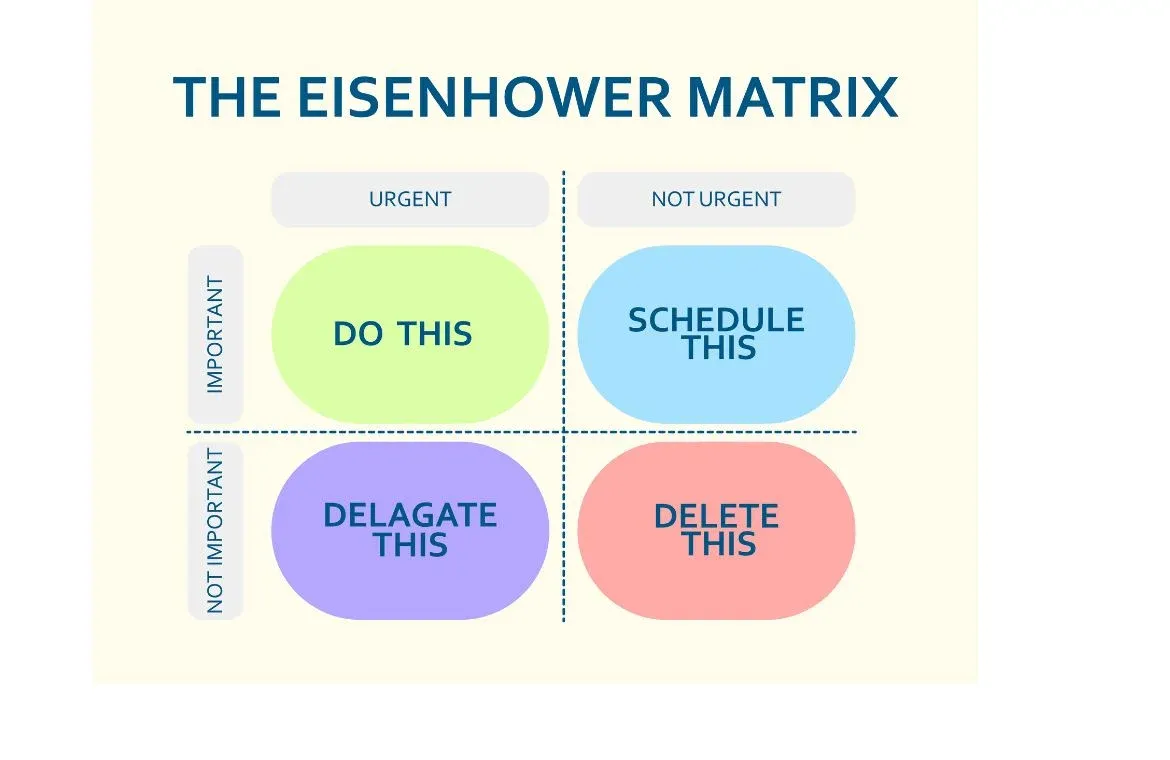Learn Essential Time Management Skills for Improving Work Efficiency

“The bad news is time flies. The good news is you’re the pilot.” - Michael Altshuler's observation, though broad, hits a daily truth: 24 hours is all we get. Amidst the hustle, it's easy to forget this equal playing field where some thrive and others stagnate.
Time management skills revolutionize how professionals work and live. Time management involves intentionally planning and controlling how you spend time on tasks to boost efficiency. This often includes setting deadlines, using to-do lists, and rewarding yourself for achievements. Ultimately, it's about motivating yourself to tackle necessary tasks to reach your desired outcomes.
Time management does more than just help you complete tasks faster. When you organize and prioritize well, you become more creative and proactive with your goals. This leads to achieving a better lifestyle. Time management forms the foundations of lower anxiety, better focus, and boosted productivity. Your career growth and daily work experience depend on knowing how to manage time well.
What is time management, and why does it matter
Time management means planning and controlling how you use your time. Many people think time management means controlling time itself. However, we all have the same 24 hours each day. The real focus lies in managing life events within the time we have.
Understanding the concept of time management
Time management requires organizing tasks strategically based on available time. The process resembles a juggling act, where you plan activities to work smarter, not harder. Several key elements make up this concept:
- Planning and scheduling tasks by priority
- Setting achievable goals and deadlines
- Delegating tasks when needed
- Making smart choices about time use
- Managing distractions effectively
The concept has grown from basic checklists to sophisticated methods that line up tasks with goals and personal values. Today's time management focuses on self-management instead of watching minutes tick by. Success comes from managing expectations, relationships, and results effectively.
The importance of time management in daily work
Time management means more than checking off items on a to-do list. Professionals need solid time management skills to advance their careers and find personal satisfaction.
Good time management brings many benefits. People who manage their time well see increased efficiency, more energy for important work, lower stress levels, extra free time, better achievements, stronger relationships, and greater self-esteem. Research shows that becoming skilled at time management builds workplace confidence through positive self-reinforcement.
The core team notices employees who finish tasks on schedule. These reliable team members often receive better career opportunities and potential promotions. Proper time management helps workers deliver quality results while meeting deadlines efficiently.
Time management becomes crucial because it lets professionals concentrate on high-value work. Activities take different amounts of time and have varying importance. Moving more hours toward important tasks improves productivity and work-life balance.
Time Management Skills
In today's rapidly evolving professional landscape, mastering time management skills isn't just beneficial, it's essential for future-proofing your career. These foundational capabilities separate high-performing professionals from the rest, enabling you to maximize productivity while maintaining balance.
Organization: The Foundation of Efficiency
Organization creates the structure that supports all other time management efforts. Learn to establish systems that minimize cognitive load and maximize productivity through:
- Creating dedicated workspaces that eliminate distractions
- Implementing digital and physical filing systems for immediate information retrieval
- Utilizing productivity tools that complement your natural work patterns
- When you build strong organizational systems, you transform chaos into clarity, allowing you to focus on high-value activities that drive results.
Prioritization: Focus on What Truly Matters
Prioritization is the art of distinguishing between urgent and important tasks. Build hands-on expertise in:
- Employing the Eisenhower Matrix to categorize tasks based on urgency and importance
- Identifying high-impact activities that align with strategic objectives
- Eliminating or delegating low-value tasks that consume time without producing results
- Mastering prioritization ensures your energy flows toward activities that generate maximum return on your time investment.
Goal Setting: Charting Your Path to Success
Effective goal setting provides direction and purpose to your time management efforts. Develop deep expertise in:
- Creating SMART (Specific, Measurable, Achievable, Relevant, Time-bound) objectives
- Breaking large goals into manageable action steps
- Establishing measurement systems to track progress and maintain momentum
- When you set clear, compelling goals, you transform vague aspirations into concrete achievements.
Communication: Maximizing Collaborative Efficiency
Strategic communication eliminates wasted time and prevents misunderstandings. Master the art of:
- Crafting clear, concise messages that drive action
- Setting appropriate response times for different communication channels
- Establishing communication protocols that respect everyone's time
- Effective communication doesn't just save time—it multiplies the impact of your collaborative efforts.
Planning: Designing Your Path to Success
Planning transforms reactive behavior into proactive achievement. Build expertise in:
- Creating detailed yet flexible action plans
- Blocking time for deep work on high-priority tasks
- Building buffer periods to accommodate unexpected challenges
- With strategic planning, you take control of your schedule rather than allowing it to control you.
Delegation: Multiplying Your Impact
Delegation is not about offloading work it's about strategic resource allocation. Develop skills in:
- Matching tasks to team members' strengths and development needs
- Clearly communicating expectations and desired outcomes
- Establishing appropriate check-in protocols without micromanaging
- Through effective delegation, you expand your capacity and create growth opportunities for others.
Stress Management: Sustaining Peak Performance
Managing stress is essential for maintaining productivity and preventing burnout. Learn to:
- Recognize early warning signs of excessive pressure
- Implement research-backed techniques for rapid stress reduction
- Design sustainable work rhythms that support long-term performance
- By mastering stress management, you maintain the mental clarity needed for effective decision-making.
Flexibility: Thriving Amid Uncertainty
In today's disrupted world, flexibility has become a critical success factor. Develop the ability to:
- Quickly pivot when circumstances change
- Maintain productivity despite shifting priorities
- Adapt your approaches based on emerging information
- Flexibility transforms potential obstacles into stepping stones for growth and innovation.
Simple time management techniques to get started
Better time management techniques can boost productivity right away without complex systems. A few proven methods are all you need to get better at organizing your time.
Using the Eisenhower Matrix to prioritize tasks

The Eisenhower Matrix helps professionals make smarter decisions about their energy and focus by splitting tasks into four quadrants based on urgency and importance. Here's how to use this technique:
- Create a grid with four boxes labeled by urgency (x-axis) and importance (y-axis)
- Sort each task into one of the quadrants:
- Do first (urgent and important): Crisis situations, deadline-driven projects
- Schedule (important but not urgent): Long-term planning, professional development
- Delegate (urgent but not important): Certain emails, requests for assistance
- Delete (neither urgent nor important): Excessive social media, time-wasting activities
This method reshapes overwhelming to-do lists into applicable plans that let you handle priorities first while cutting out non-essential activities.
Time blocking for focused work
Time blocking reserves specific parts of your calendar for particular tasks or types of work. This technique helps you work proactively by:
- Taking control of your schedule through visual time allocation for important work
- Cutting down on context-switching by grouping similar tasks
- Protecting your deep work periods from disruptions
Schedule your most challenging tasks during peak energy hours to get the best results. Leave some buffer time between blocks to handle unexpected issues.
The 20-minute rule to overcome inertia
Difficult tasks often create the most resistance. The 20-minute rule breaks through this barrier by:
- Setting a timer for just 20 minutes of focused work
- Committing to stop when the timer ends
- Deciding after 20 minutes whether to continue
This approach works because objects in motion stay in motion you'll likely want to keep going once you start. The power lies in breaking down the psychological barrier into smaller, manageable pieces.
Building habits for effective time management
Building systems that arrange with your priorities and work styles helps turn time management techniques into lasting habits. New habits don't form overnight they just need intentional practice and custom approaches that fit your situation.
Setting SMART goals for better direction
SMART goals are the foundations of managing time well. They help turn unclear intentions into clear plans with direction. The SMART framework stands for:
- Specific: Clearly define what you want to accomplish rather than setting general aims
- Measurable: Set concrete criteria to track progress and determine success
- Achievable: Make realistic goals based on your resources and capabilities
- Relevant: Your goals should match your broader personal or professional priorities
- Time-bound: Set clear deadlines to stay focused and avoid procrastination
To cite an instance, see how "I want to be more productive" becomes "I will complete three client projects within the next quarter". This clear approach creates accountability and helps you track progress toward measurable results.
Creating a daily system that works for you
Individual-specific systems work better than generic approaches. The sort of thing I love about effective planning starts with your natural energy patterns throughout the day. You should schedule challenging tasks during morning hours if you feel most energized then. Your planning tools should match your style since consistency comes from using systems that feel accessible.
Time management experts suggest sticking to one planning tool instead of switching between multiple systems. Digital calendars, paper planners, or specialized apps can work well the key lies in finding what suits your lifestyle. Many professionals succeed by:
- Starting each day with a prioritized to-do list
- Setting specific time blocks for different activities
- Adding buffer time for unexpected tasks
- Making time for personal well-being alongside work duties
Note that "each person's day-to-day is different and unique to them," so good systems must fit individual circumstances. Habits take time to form, but using personal routines consistently turns scattered efforts into reliable productivity patterns.
Conclusion
Time management mastery revolutionizes professional performance and personal well-being. It strengthens professionals to prioritize high-value work instead of just reacting to daily urgencies.
Professionals face several challenges. Procrastination comes from emotional discomfort, digital interruptions never stop, and setting boundaries remains tough. These obstacles need a well-laid-out approach to overcome.
Developing effective time management skills offers significant benefits in both personal and professional spheres. By facilitating the identification of priorities and the systematic organization of tasks, these skills are instrumental in enhancing productivity and fostering a healthy work-life integration.
Pursuing a business management course can help different business professionals to learn time management as well as other critical management skills required to thrive in the competitive business landscape.
Time management isn't just about rigid schedules – it crucially includes space for change.

TalentSprint
TalentSprint is a leading deep-tech education company. It partners with esteemed academic institutions and global corporations to offer advanced learning programs in deep-tech, management, and emerging technologies. Known for its high-impact programs co-created with think tanks and experts, TalentSprint blends academic expertise with practical industry experience.



